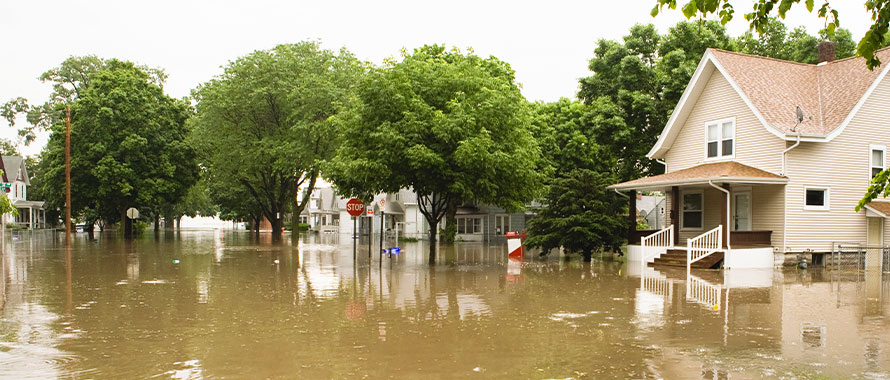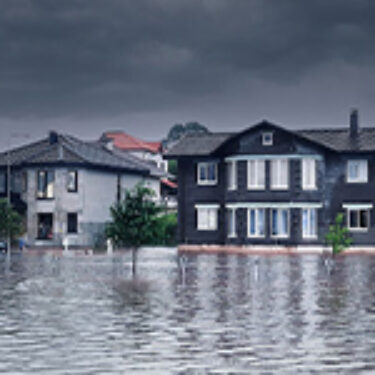A growing number of individuals are at risk for flood damage to their homes, but many remain uninsured. To learn more about Flood Insurance, we spoke with Jacob Martin, Manager, Flood, Burns & Wilcox, Charlotte, North Carolina.
How serious is the risk of flood for homeowners today?
J.M.: What we are seeing with climate change is more severe storms. As wind speeds increase, that creates greater storm surges. Flood is not just a peril for coastal homes; it is also a peril for inland homes. We see this all the time where a hurricane comes in, brings water inland, and ends up dropping it on states like Pennsylvania, inland areas in New York, West Virginia, Kentucky, and other non-coastal areas. Flood is going to continue to be a more present exposure to homeowners.
What should homeowners be aware of relative to this risk?
J.M.: When homeowners are considering building or buying a home, that is a time when they should consider flood as a peril. For all homeowners, the most important thing to understand is that under a typical Homeowners Insurance policy, flood is not covered. For homeowners to get adequate coverage, they typically have to seek out a separate policy specifically for flood. Traditionally, that was through the National Flood Insurance Program (NFIP), but now you have the option of the private flood insurance market. Private flood has many benefits over the NFIP, such as more expansive coverage forms and higher levels of service.
What are some of the limits and examples of covered expenses under Flood Insurance?
J.M.: With the NFIP, they are capped on what they will offer for limits. For a dwelling, the maximum limit is $250,000 for the building and $100,000 for its contents. The private Flood Insurance market can go well above that. One of the primary benefits of the private market is you can combine primary Flood Insurance and Excess Flood Insurance together. The private market also can offer enhancements for things like personal property in the basement, lawn and trees on the property, pool refill and repair, loss avoidance measures like sandbags, and other structures. For example, an NFIP policy can allocate up to 10% of its limits to a detached garage; otherwise, the owner would need a separate policy for other buildings on their property. We also get a lot of requests for adding coverage for personal property in the basement, which is not covered on an NFIP policy. That is a definite coverage gap that a lot of homeowners have.
Is there anything else homeowners should know about flood risk?
J.M.: Inflation is a big trend we are seeing right now with its impact on the cost of reconstruction. The NFIP has not increased the maximum limits they will offer so many clients are turning to an excess flood policy. The excess limits cover a catastrophic loss that exceeds the primary layer. Otherwise, the client will have a coverage gap that they will be personally responsible for. Excess policies can be very affordable, depending on their needs and the exposure at the location.
What are the greatest opportunities for brokers to get into Flood Insurance?
J.M.: Many brokers are not writing the coverage, unless it is required by a loan transaction; we recommend brokers should offer a flood quote with every single property quote. The mentality may be that they think it is complicated, but there are experts available who specialize in flood. When agencies are not offering the coverage and a flood does happen, it leaves them open to an Errors & Omissions exposure. In the past, Flood Insurance was offered when it was required by mortgages in high-risk zones, but we have seen over the years that the zone a property is in does not necessarily reflect the actual exposure of flooding. Offering Flood Insurance despite the zone is going to be very crucial for agencies going forward.
What advice would you give brokers to increase their success rates with these products?
J.M.: Form a good relationship with a flood expert. Have someone to answer your questions about what is covered and not covered on the policy forms. You don’t want there to be any surprises at the time of a claim for something excluded under the policy language. Offer an Excess Flood Insurance quote as well. We are seeing Excess Flood Insurance growing by leaps and bounds. Give the client the opportunity to decline the coverage if they don’t want it.
What services or features of Flood Insurance are specific to Burns & Wilcox?
J.M.: We have plenty of capacity available, including in Florida. We are writing in all 50 states. We have enhancements available for primary flood and that is really where the private market shines in terms of flood coverage. It is not as rigid as the NFIP. We also can provide a lot of value to clients as experts in a consulting role. Our goal is to partner with and support our clients through the entire process, including marketing, risk analysis, competitive terms through a large portfolio of products, and advocation through the claims process.
What questions should brokers be asking clients relative to these products?
J.M.: The average flood claim costs $45,000 and typically your Homeowners Insurance is not going to cover it. Are you prepared to self-insure that? Additionally, being aware of enclosure locations, such as basements, storage areas and content’s locations are all important aspects that can affect the exposure and proper policy placement.
Why your clients might need it: Storm severity and flood damage is high for both coastal and inland homes as a result of climate change.
Protects against: Property damage and home repairs due to storm/flood damage. Enhancements can be added for personal property and other elements on a person’s property.
Expert opinion: “When homeowners are considering building or buying a home, that is a time when they should consider flood as a peril. For all homeowners, the most important thing to understand is that under a typical Homeowners Insurance policy, flood is not covered.”




